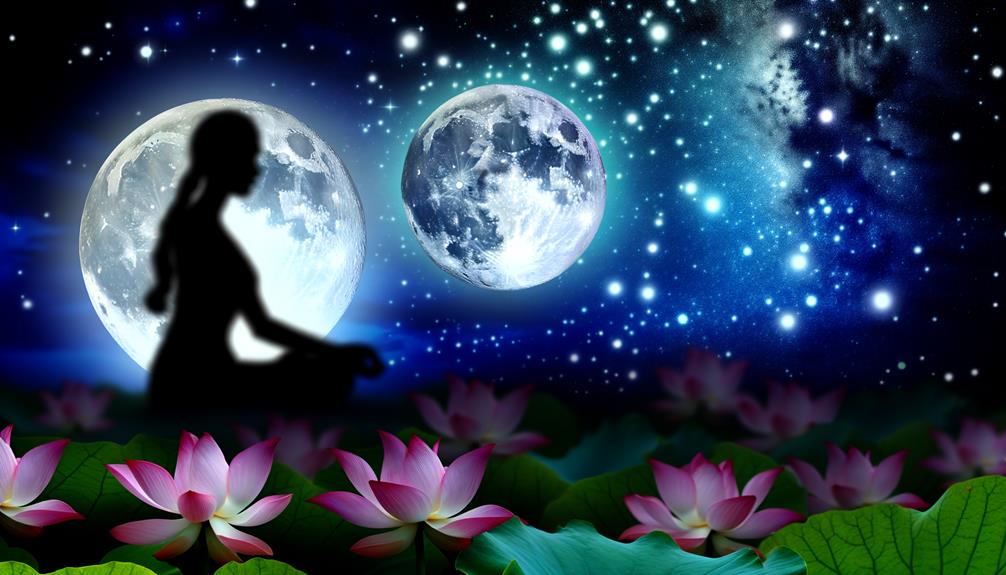Nisha Name Meaning in English
Derived from the ancient Sanskrit language, the name 'Nisha' translates to 'night' in English, symbolizing tranquility, mystery, and introspection. This name has profound roots in Indian culture, with significant liturgical importance in Hinduism, Buddhism, and Jainism.
Nisha's etymology links it to natural cycles and celestial phenomena, reflecting serenity and hidden depths akin to the night. It also holds considerable cultural weight, often chosen for its auspicious connotations during naming ceremonies.
Its rich historical and cultural tapestry offers a fascinating exploration into its popularity and variations across different cultures and languages. Explore further to uncover all facets of this enigmatic name. In addition, the Niharika name meaning is also closely related to Nisha, as both names have ties to the night and its symbolism. The depth of meaning and cultural significance associated with these names makes them a popular choice for many families seeking to impart a sense of tranquility and spiritual connection. Exploring the origins and nuances of these names can provide a deeper understanding of the traditions and beliefs that have shaped them over time.

Key Takeaways
- Nisha translates to 'night' in English.
- The name Nisha symbolizes tranquility, mystery, and introspection.
- Derived from the ancient Sanskrit language with cultural roots in India.
- Associated with lunar influence and astrological significance in Vedic astrology.
- Represents qualities like serenity, hidden depths, and emotional intelligence.
Etymology and Origins
Derived from the Sanskrit language, the name Nisha has its origins deeply rooted in ancient Indian culture and linguistics. Historically, Sanskrit is one of the oldest languages known to humanity, serving as the liturgical language of Hinduism, Buddhism, and Jainism.
The term 'Nisha' translates to 'night' in English, embodying the serene and tranquil nature often associated with the nighttime. This etymological origin indicates a profound connection to natural cycles and celestial phenomena, which were highly significant in ancient Indian cosmology.
The name's prevalence in classical literature and ancient texts underscores its longstanding presence and importance. Therefore, Nisha is not merely a name but a representation of a rich historical and linguistic heritage, echoing through centuries of cultural evolution.
Cultural Significance
Beyond its etymological roots, the name Nisha carries significant cultural weight in various traditions, symbolizing qualities such as tranquility, mystery, and introspection that are deeply revered in Indian society.
The cultural significance of Nisha can be understood through the following aspects:
- Mythological Importance: In Hindu mythology, night is a time for contemplation and spiritual growth, aligning with the deeper meanings of Nisha.
- Astrological Influence: In Vedic astrology, the name is often associated with lunar qualities, reflecting calmness and emotional depth.
- Cultural Practices: Nisha is frequently chosen during naming ceremonies for its auspicious connotations and its embodiment of serene beauty.
These elements illustrate the profound cultural resonance of the name Nisha, transcending mere nomenclature.
Nisha in Literature
The name Nisha, often symbolizing night or darkness, holds profound symbolic significance in literature, representing mystery, introspection, and the unknown.
Numerous literary characters named Nisha have been inspired by these themes, embodying complex, enigmatic personas that enrich narrative depth.
Additionally, Nisha's cultural representation provides a rich tapestry for exploring themes of identity and heritage, reflecting its diverse, multicultural roots in literary works.
Nisha's Symbolic Significance
In various literary traditions, the name Nisha is often imbued with profound symbolic significance, frequently representing themes of mystery, tranquility, and the ethereal qualities of night. Historically, authors have utilized the name to evoke a sense of:
- Mystery: Nisha often symbolizes the unknown, conjuring images of the enigmatic and the concealed, much like the night itself.
- Tranquility: The name is associated with calmness and peace, reflecting the stillness and serenity that night brings.
- Ethereality: Nisha embodies the transient, otherworldly aspects of nighttime, suggesting a connection to dreams and the celestial.
These themes illustrate how Nisha transcends mere nomenclature, becoming a literary device that enriches narratives with layered meanings and emotional depth.
Literary Character Inspirations
Numerous literary works have featured characters named Nisha, drawing upon the name's rich symbolic significance to enhance the narrative's thematic depth and emotional resonance.
In Indian literature, Nisha is often a character that embodies the enigmatic beauty and tranquility of night, as her name suggests. Historically, novels and poems have leveraged the name to evoke a sense of mystery, introspection, and inner strength.
For instance, in contemporary fiction, characters named Nisha frequently navigate complex emotional landscapes, reflecting the multifaceted nature of human experience. These literary portrayals not only encapsulate cultural and existential themes but also resonate universally, allowing readers to explore profound emotional and philosophical dimensions through the lens of a character named Nisha.
Nisha's Cultural Representation
Cultural representation of the name Nisha in literature reveals a profound interplay of symbolic meanings, reflecting themes of night, mystery, and introspection across various narratives. Historically, the name has been a favorite among authors to evoke a sense of the ethereal and the enigmatic.
The following examples illustrate its rich literary usage:
- Classical Poetry: Poets have long used 'Nisha' to symbolize the night, a time for contemplation and emotional depth.
- Modern Novels: Contemporary authors often assign the name to characters who embody mystery and hidden depths, resonating with the intrinsic qualities associated with night.
- Folklore: In traditional stories, Nisha is frequently portrayed as a wise, introspective figure, guiding other characters through their darkest hours.
This name's literary embodiment consequently enriches its cultural significance.
Nisha in Different Languages
The name Nisha presents a fascinating study in linguistic variation, as its pronunciation can differ greatly across languages, reflecting diverse phonetic traditions.
Moreover, its cultural significance varies, with some societies attributing deeply spiritual connotations while others emphasize more secular meanings.
Additionally, common spelling differences emerge in transliterations, influenced by regional orthographic standards and phonological constraints.
Pronunciation Across Languages
Variations in the pronunciation of the name 'Nisha' can be traced across several languages, reflecting the unique phonetic and cultural characteristics of each. In Hindi and other Indic languages, 'Nisha' is typically pronounced as 'Nee-sha,' with a soft 'n' and elongated 'ee'.
Arabic speakers might pronounce the name as 'Nee-sha' as well, but with a slightly different emphasis due to Arabic phonetics. The nuances in pronunciation are subtle but significant:
- Hindi/Indic Languages: 'Nee-sha'
- Arabic: 'Nee-sha' with varied emphasis
- English: 'Nih-sha' with a short 'i' sound
These distinctions illustrate the interplay between linguistic structures and cultural influences, offering a rich tapestry of auditory diversity for the name 'Nisha'.
Cultural Significance Variations
In examining the name 'Nisha' across different cultures, one finds a myriad of interpretations and significances that reflect the historical and social contexts of each linguistic tradition.
In Sanskrit, 'Nisha' signifies 'night,' symbolizing tranquility and introspection.
In Arabic, the name takes on a slightly different connotation, often linked to 'Nisaa,' meaning 'woman,' embodying feminine grace.
Meanwhile, in the Swahili language, 'Nisha' is derived from 'Anisha,' meaning 'life' or 'living,' highlighting vitality.
These variations underscore how a single name can encompass diverse cultural values and attributes. Each linguistic interpretation provides nuanced layers of meaning, illustrating the dynamic interplay between language and cultural identity. Understanding these differences enriches one's appreciation of the name's multifaceted essence.
Common Spelling Differences
Spelling differences for the name 'Nisha' across various languages often reflect the phonetic and orthographic conventions unique to each linguistic tradition. These variations provide a fascinating glimpse into the historical and cultural adaptations of the name.
Here are some notable examples:
- Neesha (Hindi, Sanskrit): This variation retains the original pronunciation while employing alternative phonetic spelling.
- Nisaa (Arabic): Reflecting Arabic script's phonetic properties, this translation shifts the name to align with local linguistic norms.
- Nisha (Japanese: ニシャ): In Japanese, the name often appears in katakana script, which is used for foreign words and names, thereby preserving the phonetic integrity while adapting to the Japanese writing system.
These variations underscore the global resonance and adaptability of the name 'Nisha.'
Popularity Over Time
Over the past few decades, the name Nisha has experienced fluctuating levels of popularity, influenced by cultural trends, media representation, and shifting societal preferences. Initially gaining traction in the late 20th century, the name found favor particularly within South Asian communities, reflecting its deep cultural roots.
In the 1990s, the name saw a surge, partly due to increased visibility in popular media and the global diaspora's cultural exchange. However, its popularity has waxed and waned since, correlating with broader naming trends and generational shifts.
Analytical data from naming registries indicate that while Nisha remains a beloved choice, especially in regions with strong South Asian influences, its appeal fluctuates, mirroring the dynamic nature of cultural and societal evolution.
Famous People Named Nisha
The name Nisha has been borne by numerous influential figures across various domains, reflecting its widespread appeal and cultural significance.
Prominent Bollywood actresses such as Nisha Kothari have made notable contributions to Indian cinema, while authors like Nisha Minhas have enriched literary landscapes with their compelling narratives.
Additionally, the name has found resonance in the political arena, with figures like Nisha Biswal holding significant positions and impacting policy on an international scale.
Prominent Bollywood Actresses
Several notable Bollywood actresses have borne the name Nisha, each contributing uniquely to the Indian film industry through their diverse roles and performances. Their impact is both historical and significant, paving the way for future generations.
- Nisha Kothari – Known for her bold roles in films like 'Sarkar' (2005) and 'James' (2005), Nisha Kothari's dynamic acting left an indelible mark on the industry.
- Nisha Noor – Although primarily a South Indian actress, her occasional Bollywood appearances in the 1980s showcased her versatile talent.
- Nisha Yadav – An emerging actress in the 2020s, Nisha Yadav has been noted for her performances in independent films, adding depth and nuance to contemporary cinema.
These actresses exemplify the diverse range of talent associated with the name Nisha in Bollywood.
Renowned Authors Named Nisha
In the literary domain, authors named Nisha have made significant contributions, enriching the global literary landscape with their diverse storytelling and profound insights.
Nisha Minhas, a British author, is known for her romantic comedies that explore themes of cultural identity and relationships, resonating with a broad audience. Her works such as 'Chapatti or Chips?' and 'Sari and Chips' exemplify her narrative prowess.
Another notable figure is Nisha Susan, co-founder of the media company The Ladies Finger, who has made her mark with incisive essays and short stories. Her writings often explore contemporary societal issues, providing critical perspectives.
Such authors named Nisha continue to shape and influence literary traditions, offering readers a wealth of thought-provoking literature.
Influential Nisha in Politics
Among the notable figures in politics, Nisha Biswal stands out for her impactful tenure as the Assistant Secretary of State for South and Central Asian Affairs in the United States. Her leadership in this role from 2013 to 2017 was marked by significant diplomatic initiatives and policy advancements. Biswal's efforts played an essential role in strengthening U.S. relations with South and Central Asia.
Her work can be highlighted through:
- Economic Partnerships: Promoting trade and investment opportunities between the U.S. and South Asia.
- Security Collaborations: Enhancing regional security through strategic partnerships.
- Humanitarian Initiatives: Addressing human rights and promoting democratic governance.
Biswal's contributions have left a lasting legacy in international diplomacy, underscoring the importance of skilled leadership in global affairs.
Name Variations
Throughout various cultures and languages, the name Nisha has evolved into numerous variations, each carrying subtle nuances and distinct phonetic characteristics.
In Sanskrit, Nisha translates to 'night,' reflecting its origins in ancient Indian texts.
Arabic-speaking regions have adopted the name as Nisaa or Nisha, often associated with elegance and femininity.
In Persian cultures, it's seen as Nishe, maintaining its melodic pronunciation but with a slightly different spelling.
The name also appears in various forms in African cultures, such as Nishan in Eritrea, symbolizing 'mark' or 'sign.'
These variations not only highlight the name's adaptability but also its rich, multifaceted heritage, emphasizing the cultural and linguistic diversity that has shaped its evolution over centuries.
Symbolism and Traits
The name Nisha, deeply rooted in ancient traditions, encapsulates a rich tapestry of symbolism, often representing the serene and mysterious qualities associated with the night. Historically, Nisha is derived from Sanskrit, where 'nisha' translates directly to 'night.' This connection imbues the name with a sense of tranquility, introspection, and the hidden depths of the nighttime hours.
Key symbolic traits include:
- Serenity: Reflecting the calm and quiet of the night, Nisha often symbolizes peace and relaxation.
- Mystery: Like the night sky, Nisha carries an aura of enigma and profound depth.
- Introspection: Nighttime is often a period for reflection and thought, traits commonly associated with those named Nisha.
These elements collectively highlight the rich, multifaceted nature of the name.
Astrological Connections
Exploring the astrological connections of the name Nisha reveals its alignment with celestial elements that enhance its symbolic resonance. Historically, Nisha is associated with lunar influences, deriving its essence from the moon's serene and nurturing qualities.
Astrologically, individuals named Nisha often fall under the zodiac sign of Cancer, ruled by the moon itself, which signifies deep emotional intelligence and intuitive capabilities. Additionally, the name is linked to the water element, symbolizing fluidity, adaptability, and emotional depth.
In Vedic astrology, Nisha is often connected with the Nakshatra (lunar mansion) Ashlesha, which bestows charisma and a transformative nature. These celestial alignments underscore the name's intrinsic qualities, enriching its cultural and astrological significance.
Choosing Nisha for Your Baby
When considering the name Nisha for your baby, it is crucial to analyze its rich historical and cultural significance. This encompasses both its linguistic origins and its profound astrological connections. Understanding these factors will guarantee a well-rounded appreciation of the name's depth and relevance.
Linguistic Origins: Nisha, derived from Sanskrit, means 'night,' symbolizing peace and tranquility.
Cultural Importance: In various South Asian cultures, Nisha is associated with beauty and mystery, often featuring in literature and folklore.
Astrological Links: Astrologically, Nisha falls under the lunar constellation, often linked to calmness, introspection, and creativity.
Conclusion
Essentially, the name Nisha, imbued with the mystique of night, traverses a rich historical and cultural tapestry. Its significance is not simply linguistic but deeply interwoven with literary and astrological traditions.
The name's enduring popularity and myriad variations across languages underscore its universal appeal. Choosing Nisha for a child is akin to bestowing a timeless symbol of tranquility and depth, reflecting the night's serene yet profound core, resonating through ages and cultures.






